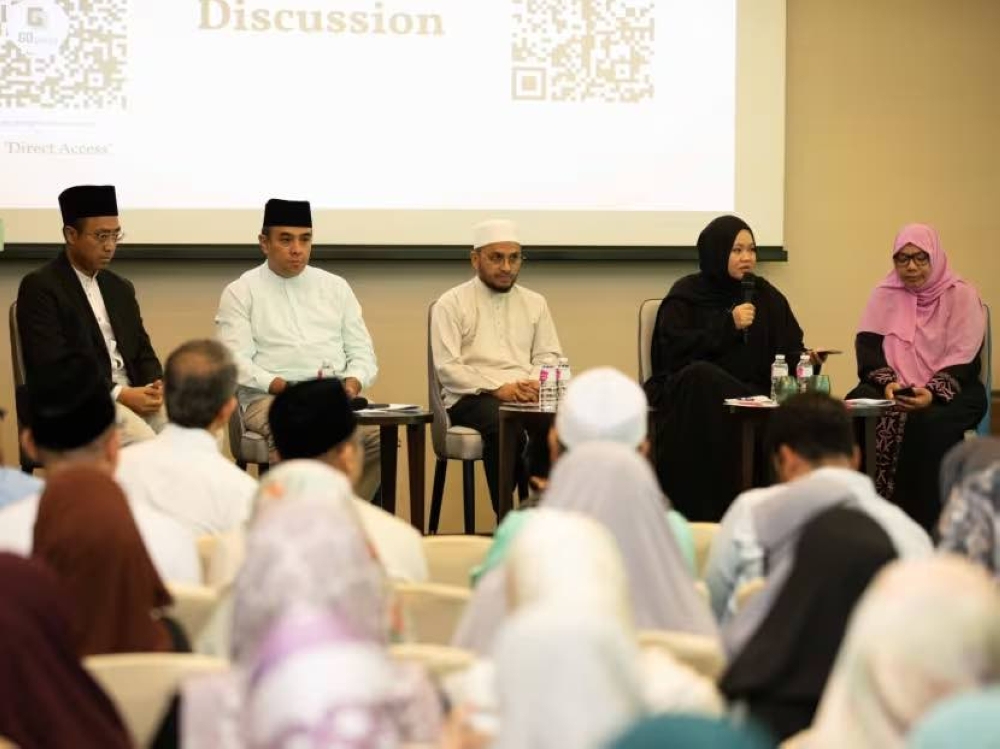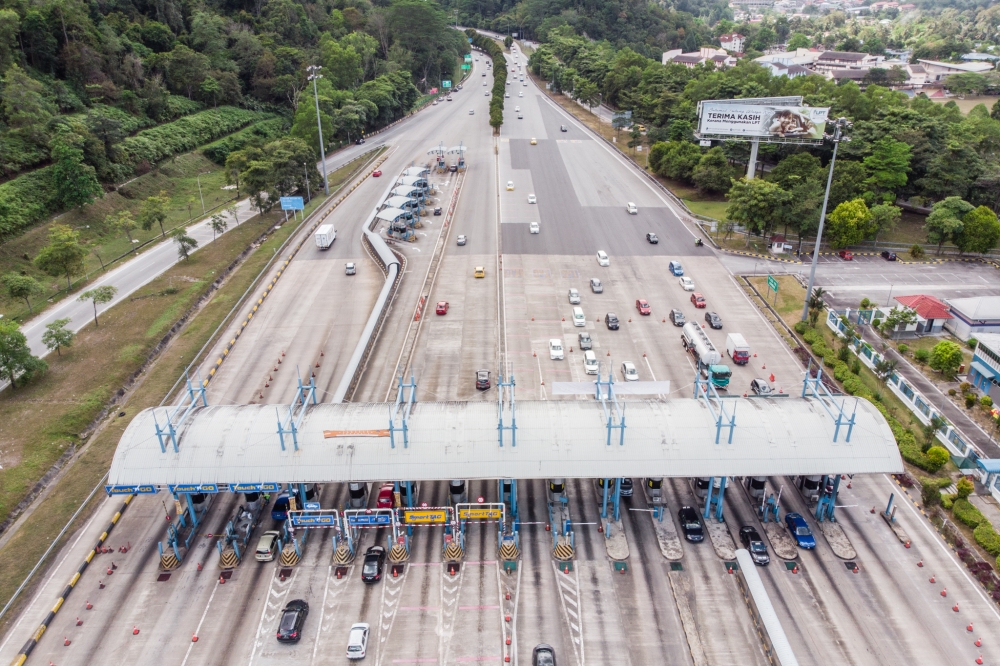SINGAPORE, Nov 3 — A sense of helplessness amid a desire to do more to help the victims of the humanitarian crisis in Gaza, as well as whether youths should boycott certain products and quit their jobs at companies with reported links to Israel are among concerns and issues raised by Islamic religious teachers at a forum on Thursday (Nov 2).
In turn, top Islamic leaders here emphasised the need for asatizahs — or Islamic religious teachers — to empower the Muslim community to respond to these concerns constructively and in an engaged manner.
These include contributing to humanitarian aid, fulfilling their family obligations and playing their part in strengthening the intercommunal relationships here.
The forum, attended by about 120 Islamic religious teachers, was organised by the Islamic Religious Council of Singapore (Muis), in partnership with the Singapore Islamic Scholars and Religious Teachers Association (Pergas), Religious Rehabilitation Group (RRG) and Asatizah Youth Network (AYN).
The religious bodies and networks gave presentations on various topics relating to the conflict in Gaza, including discussing on religious advisory and guidance for the community here, as well as how extremists can exploit the occurrences of such conflicts to lure people to their course.
The three-hour forum, which was also attended by Minister of State for Home Affairs and National Development Muhammad Faishal Ibrahim, capped off with a closed-door panel discussion.
Speaking to the media after the forum, Singapore’s Mufti Nazirudin Mohd Nasir was asked by TODAY about the key concerns raised by the participants during the closed door discussions.
The Mufti, who oversees religious rulings for Muslims in the country, said two main concerns were brought up: What else can the local community do to help the victims of the conflict, and how to tackle the conflicting narratives seen online.
“The sense of helplessness is very real, but we need to be able to help them with that sense of helplessness,” said Nazirudin, on the desire of the local community to do more to help the victims of the war.
Hence, it was important for the religious leaders and teachers to provide guidance on how the community can play their part to help the victims of the conflict — such as by praying for peace and by contributing to humanitarian efforts.
Another concern raised by the audience, said the Mufti, was the myriad of narratives from various online sources surrounding the conflict.
“And these could cause confusion in the Muslim community as to what their responsibilities are, and what they should do as Muslims in the current conflict,” he said.
Again, the religious leaders play an important role to guide the community in navigating such issues and dealing with how the conflict is affecting the local community here spiritually and emotionally.
In this regard, the Office of the Mufti under Muis is currently refining an irshad or religious advisory on the matter. The religious teachers had also discussed the irshad, to be released at a later date, during the forum.
Nazirudin said the irshad is meant to help the Muslim community look at how such conflicts impact “our religiosity, and how to best manage that in a wise, constructive and positive way”.
This can be done by strengthening spirituality, as well as channeling efforts towards humanitarian aid for the victims and to continue strengthening inter-communal relations here, he added.
Israel has been bombarding the Gaza Strip for about four weeks, killing almost 9,000 Palestinians, the majority of whom are children and women, according to the Gaza health ministry.
This was in response to an incursion on October 7 by Palestinian militant group Hamas, which according to Israeli officials led to the killing of 1,400 people and taking of more than 230 hostages.
International bodies have described the situation in Gaza as a humanitarian crisis, in light of the high fatality and much higher number of displaced civillians.
Many nations have condemned Hamas’ terrorist attack on Israel and supported Israel’s right to defend itself. At the same time, as the civilian toll in Gaza mounted, there has also been calls for Israel to respect and uphold international law.
On October 27, Singapore voted in favour of a United Nations resolution to protect civilians and uphold legal and humanitarian obligations amid the conflict.
The Singapore Government in October said it would contribute S$300,000 towards relief operations through the Singapore Red Cross, in response to the humanitarian crisis in the Palestinian territory of the Gaza Strip.
Ustaz Muhammad Tarmizi Abdul Wahid, president of Pergas, told reporters that one of the “common” questions that religious teachers receive from youths is whether they should boycott products from Israel.
A Palestinian-led movement called Boycott, Divestment, Sanctions targeting Israeli goods and companies was founded in 2005 to rally the international community “to pressure Israel to comply with international law”, according to the movement’s website.
“We hear stories of the young quitting their jobs in certain companies just because they feel like there is a strong affiliation (between their employer and Israel),” said Ustaz Muhammad Tarmizi.
However, he said that doing that may result in them neglecting their responsibilities to their families or themselves.
“They need alternative advice, but they also need an alternative way to express their support,” he said, adding that it was important that the youth “feel they are contributing” to address the humanitarian crisis.
Ustaz Muhammad Tarmizi also said religious teachers here play a range of important roles with regard to guiding the local community’s response to the ongoing conflict.
These would include being an outlet for members of the community to express their feelings and refer questions to, especially given the “bombardment” of information that they are exposed to on social media, as well as to guide their followers to contribute towards the unity and harmony among the wider community.
As such, organising such forums as well as the issuing of a guidance by Muis are “important” to empower the religious teachers to perform these roles.
Validating the community’s feelings
Ustazah Nadia Hanim Abdul Rahman, a representative from AYN, told reporters that religious teachers here have received a “spectrum” of questions from youths about the conflict in Palestine.
But among the recent ones they have heard is surrounding the concept of jihad, which was asked by youths who have seen social media videos of people in other countries leaving their families behind to fight for the Palestinians.
Jihad in Islam refers to striving or struggling towards goodness. However, it is commonly misrepresented by extremist groups, for example, as justification for armed struggle and violence to support the groups’ cause.
People in such videos showed pride to leave their families behind to fight in Palestine and claim to be “more religious” for doing so, which led some youths to ask if they were less pious for not doing so as well, she said.
“And that’s when our asatizahs play an important role to actually guide them, to tell them that that’s not the case,” said Ustazah Nadia.
She added that there are other religious narratives in Islam which disallow Muslims to forsake their responsibilities here to take up armed struggle elsewhere, and such narratives are “more relevant to our context”.
Ustaz Mohamed Ali, co-chairman of the RRG, said that many members of the community here — both Muslims and non-Muslims — are “full with sentiments” of frustration and anger observing the humanitarian crisis in Gaza.
Not validating these sentiments and feelings could potentially lead to some individuals becoming self-radicalised, he said.
“And we have had cases in Singapore in the past where individuals, young people, they got radicalised and the trigger was the Israeli-Palestinian conflict,” said Mohamed.
Hence, there is a “dire need” for the young ones especially, to have a full understanding of the conflict and be guided in dealing with the sentiments arising from witnessing the conflict, he said. —TODAY






















